Harnessing Intelligence: A Framework for AI Teaching Assistants in the Study of East Asian Buddhist Art, History, and Culture
DOI:
https://doi.org/10.63593/RAE.2788-7057.2025.07.005Keywords:
Artificial Intelligence in Education (AIEd), art history, Buddhist art, digital humanities, pedagogical framework, ethical AI, cultural heritageAbstract
Though AI is reliant on data rather than on interpretive and conceptual thinking, AI presents new opportunities and contingencies to scholars of humanities as well as those in the natural sciences to leverage new visual modes of information and interpretation. As AI starts to invade education, one needs to be critical of its uses in areas that really need depth of cultural issues and philosophy. This article draws from literature in AI in Education (AIEd), art history pedagogy and East Asian Buddhist studies to fashion a theoretical framework through which to approach these issues. The author contends that the implementation of AI has potential (and significant) benefits, but it also comes with risks — algorithmic bias, an oversimplification of complex philosophies, and the possibility that students’ critical thinking skills will be sidelined when they become so reliant on AI for instant information. In response to some of these challenges, we suggest guidelines for developing and integrating AI-teaching assistants (AI-TAs) that respect cultural diversity, promote hermeneutic justice, and are based on human-centered design. The paper argues that the necessity of the human educator is not diminished; rather it is accentuated in the AI-managed learning environment, evolving into content curation, guiding critical conversations, and teaching AI literacy. This study offers a precedent for selective use of AI in other culturally rich, specialized humanities disciplines.


